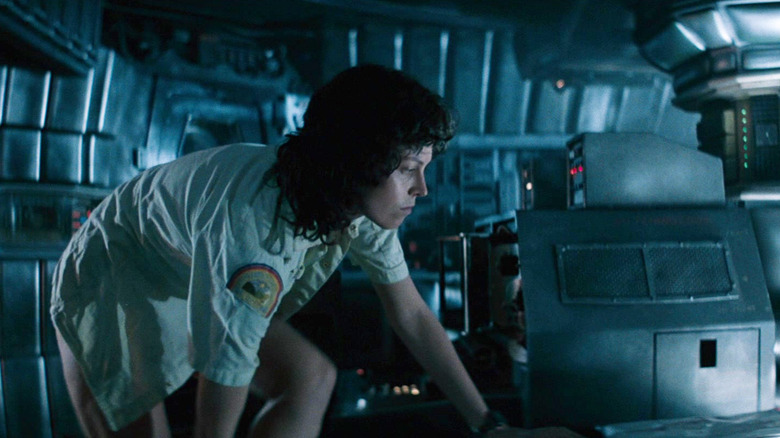Este post contém spoilers Para “Alien”, de Ridley Scott.
The term “iconic” is often thrown around willy-nilly, but few sci-fi horror films deserve the label like “Alien,” which emerged as a genre classic as soon as it burst onto the scene in 1979. Ellen Ripley (Sigourney Weaver) has redefined our understanding of what “final girl” stands for, etching a portrait of level-headed bravery and fearless compassion like never before. Depois que Ripley consegue escapar para o ônibus espacial com o gato residente do Nostromo, Jones, no clímax do filme, somos levados a uma falsa sensação de segurança, como se reflete no fato de que Ripley começa a se despir e se preparar para a estase. No entanto, o pior não acabou, pois ela vê o xenomorfo se enrolado entre os canos, levando a uma sequência de roer as unhas, onde ela silenciosamente entra em seu traje espacial, pronto para se envolver. O que se segue é um confronto tenso e violento, mas Ripley consegue expulsar a criatura do ônibus espacial e explodi -lo no esquecimento.
Essa catarse suada é uma das muitas razões pelas quais “Alien” é tão memorável. Quando Ripley zomba ansiosamente para si mesma enquanto se prepara para a batalha com um inimigo tão formidável, compartilhamos seu medo de calçados brancos e torcem desesperadamente para que ela vença. O heroísmo de Ripley, no entanto, não é tudo coragem e poder de fogo; Ela escolhe se defender, apesar de estar assustada, lutando ativamente pela sobrevivência em uma situação para a qual ninguém na equipe de Nostromo estava preparado. A vontade endurecida de Ripley de persistir carrega para a sequência “alienígenas” e além; Independentemente do que você pensa sobre o arco de Ripley, ela é uma protagonista complexa que também serve como o plano para personagens femininas que podem se sustentar sem serem reduzidas a estereótipos banais.
Enquanto o final de “Alien” é empoderador, Stephen King aparentemente discorda (ou em um ponto). King abordou a conclusão do filme em seu livro de 1981, “Danse Macabre”, em relação a uma discussão sobre horror na literatura e cinema convencionais (via Collider). Embora o rei tenha elogiado “Alien” por sua arte, ele criticou o fim do filme, chamando -o de “sexista”. Aqui está o que o autor disse.
Stephen King achou que o final do final de Alien foi gratuito, mas ele está errado
King sentiu que a decisão de fazer Ripley se destacar até a calcinha e a cueca no final de “Alien” é desagradável, pois ele a via como uma manifestação grosseira do olhar masculino. Ele também criticou sua decisão de salvar Jones na mesma redação:
“[Ripley] breaks character at the writers’ whim by going after the ship’s cat. Allowing the males in the audience, of course, to relax, roll their eyes at each other, and say aloud or telepathically, ‘Isn’t that just like a woman?’ It’s a plot twist that relies on a sexist idea for its credibility, and we can answer the question posed above by asking, ‘Isn’t that just like a male chauvinist pig of a Hollywood screenwriter?’ This gratuitous little twist doesn’t ruin the movie, but it’s still kind of a bummer.”
Now, we need to have a conversation about the film’s hypersexualization of women, which caters exclusively to the male cinematic gaze, as these portrayals help reinforce misogynistic stereotypes in real life. That said, Ripley retreating to the safety of the shuttle is not a byproduct of sexism, but simply a logical act after suffering an unspeakable hell that claimed the lives of her colleagues. In this scene, she finally manages to disappoint the guard and feel comfortable in her own skin, allowing herself to relax after the endless carnage that plagued the Nostromo and its inhabitants.
Furthermore, her decision to save Jones is not without character, as it merely highlights her empathy during a life-or-death situation, where she chooses not to leave a sentient life behind. After all, empathy is not a weakness, nor is it a feeling reserved for a specific gender. It’s also worth noting that Ripley must have felt a measure of guilt for not being able to save her classmates, which contributed to her decision to return and save Jones.
While King (whom I sincerely respect) understands horror intimately and is undoubtedly an expert when it comes to the genre’s associated tropes, his take on this particularly terrifying “alien” scene seems a bit misguided. In my opinion, there’s nothing gratuitous about a survivor reeling from a moment of unguarded vulnerability, where she immediately sees danger and slips back into a fighter’s seat despite her visceral fear. Furthermore, this twist circumvents the xenomorph’s stubborn insistence on hunting and killing as a species, and its defeat at Ripley’s hands leaves us mere humans with the tender hope of survival against the perfect organism.














